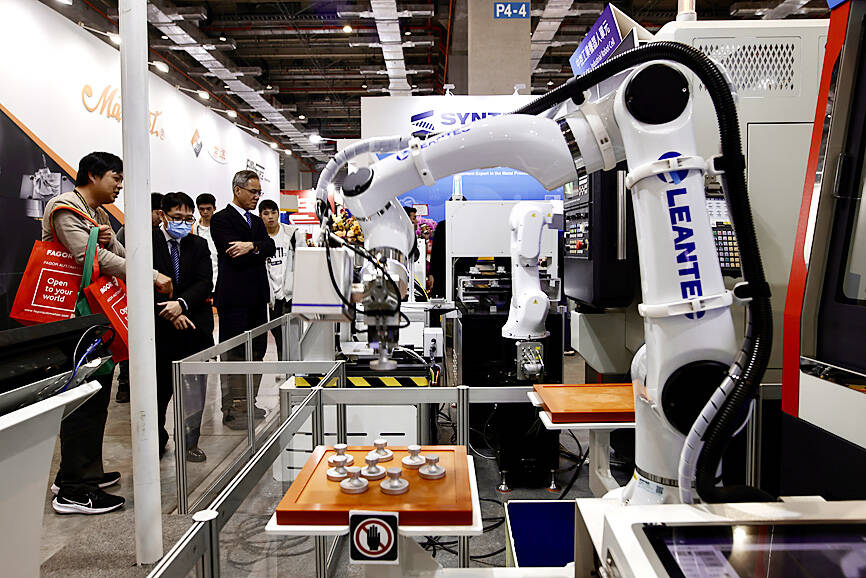Industrial production index expanded 17.91 percent annually last month to 92.44 as an artificial intelligence (AI) boom continued to fuel demand for chips and servers, the Ministry of Economic Affairs said yesterday.
Manufacturing production index, the major pillar of the nation’s industrial production index, climbed 18.95 percent year-on-year to 92.76, marking a 12th consecutive month of expansion, the ministry said.
In the first two months of this year, industrial and manufacturing production indices expanded 10.88 percent and 11.58 percent to 94.28 and 94.59 respectively, ministry data showed.

Photo: Ritchie B. Tongo, EPA-EFE
Manufacturing production index this month is expected to rise between 10.5 percent and 14.8 percent annually, and grow between 11.2 percent and 12.7 percent this quarter from the first quarter of last year, Department of Statistics Deputy Director-General Huang Wei-jie (黃偉傑) said by telephone.
“AI chips and servers continue to be the main growth drivers, as Taiwan occupies a key global position in supplying hardware,” he said.
Even though Taiwan Semiconductor Manufacturing Co (台積電) and local server makers are under pressure from customers to allocate production to the US to avoid heavy tariffs, the majority of advanced chip manufacturing and high-value server production capacity is to stay in Taiwan, Huang said.
“We should adapt to global supply chain shifts. As long as the pie [market] is growing, the impact should be insignificant,” he said.
In the first two months of the year, production of electronic components grew 17.97 percent as demand for AI and high-performance computing devices continued to boost chip production, chip packaging and wafer testing, the ministry said.
Semiconductor production in the first two months expanded 21.74 percent from a year earlier, the data showed.
Production of computers and optical components in the period surged 30.42 percent on the back of strong demand for AI applications and semiconductor inspection tools, the data showed.
China’s stimulus packages also helped boost smartphone sales, benefiting camera lens production, the ministry said.
Machinery equipment production rose 11.32 percent due to robust demand for advanced semiconductor components, as well as chip cleaning and manufacturing equipment, it said.
However, production of base metals, as well as steel, sank 9 percent in the first two months due to oversupply and price competition in the global market, while chemical materials and fertilizers dropped 1.8 percent from the same period last year amid weak demand and intensifying competition from global peers, it said.
Production of automotive products in January and last month declined 11.62 percent due to component shortages and competition from imported goods, it said.
Output of sedans, electric vehicles and commercial vehicles dropped from a year earlier, the ministry added.

STEEP DECLINE: Yesterday’s drop was the third-steepest in its history, the steepest being Monday’s drop in the wake of the tariff announcement on Wednesday last week Taiwanese stocks continued their heavy sell-off yesterday, as concerns over US tariffs and unwinding of leveraged bets weighed on the market. The benchmark TAIEX plunged 1,068.19 points, or 5.79 percent, to 17,391.76, notching the biggest drop among Asian peers as it hit a 15-month low. The decline came even after the government on late Tuesday authorized the NT$500 billion (US$15.2 billion) National Stabilization Fund (國安基金) to step in to buoy the market amid investors’ worries over tariffs imposed by US President Donald Trump. Yesterday’s decline was the third-steepest in its history, trailing only the declines of 2,065.87 points on Monday and

TAKING STOCK: A Taiwanese cookware firm in Vietnam urged customers to assess inventory or place orders early so shipments can reach the US while tariffs are paused Taiwanese businesses in Vietnam are exploring alternatives after the White House imposed a 46 percent import duty on Vietnamese goods, following US President Donald Trump’s announcement of “reciprocal” tariffs on the US’ trading partners. Lo Shih-liang (羅世良), chairman of Brico Industry Co (裕茂工業), a Taiwanese company that manufactures cast iron cookware and stove components in Vietnam, said that more than 40 percent of his business was tied to the US market, describing the constant US policy shifts as an emotional roller coaster. “I work during the day and stay up all night watching the news. I’ve been following US news until 3am

Six years ago, LVMH’s billionaire CEO Bernard Arnault and US President Donald Trump cut the blue ribbon on a factory in rural Texas that would make designer handbags for Louis Vuitton, one of the world’s best-known luxury brands. However, since the high-profile opening, the factory has faced a host of problems limiting production, 11 former Louis Vuitton employees said. The site has consistently ranked among the worst-performing for Louis Vuitton globally, “significantly” underperforming other facilities, said three former Louis Vuitton workers and a senior industry source, who cited internal rankings shared with staff. The plant’s problems — which have not

TARIFF CONCERNS: The chipmaker cited global uncertainty from US tariffs and a weakening economic outlook, but said its Singapore expansion remains on track Vanguard International Semiconductor Corp (世界先進), a foundry service provider specializing in producing power management and display driver chips, yesterday withdrew its full-year revenue projection of moderate growth for this year, as escalating US tariff tensions raised uncertainty and concern about a potential economic recession. The Hsinchu-based chipmaker in February said revenues this year would grow mildly from last year based on improving supply chain inventory levels and market demand. At the time, it also anticipated gradual quarter revenue growth. However, the US’ sweeping tariff policy has upended the industry’s supply chains and weakened economic prospects for the world economy, it said. “Now